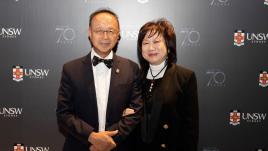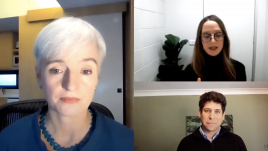Study to uncover gender-specific impacts of COVID-19
New priority research will examine the impacts of the pandemic through a gendered lens to ensure efficient patient care and policymaking.
Many diseases impact men and women differently, yet research and discussion is largely based on the experiences and outcomes of men. Heart disease, for instance, is a leading cause of illness and death for Australian women, yet a diagnosis draws heavily on research with men, and women are often misdiagnosed.
New research at UNSW aims to uncover those differences for COVID-19 specifically, to develop tailored strategies that better protect the most vulnerable during this pandemic and future outbreak. The study’s chief investigator, Scientia Professor Louise Chappell, says this research is important because sex and gender differences haven’t always been studied or taken into account in patient care or in policymaking.
“If we do not separate women and men in our research of COVID-19 and look at how they are experiencing this pandemic differently, we risk getting the wrong picture, making bad policy, and repeating these errors if we face future outbreaks,” says Professor Chappell.
This research is a truly collaborative effort, bringing together expertise from The Australian Human Rights Institute, The George Institute for Global Health, UNSW Medicine including the School of Public Health and Community Medicine, and UNSW Arts and Social Sciences including The Gendered Violence Research Network.
Mapping impacts in the hospital and the home
The study will involve a deeper investigation of evidence that has emerged during the pandemic. This includes the fact that men currently account for two-thirds of COVID-19 deaths despite confirmed cases being distributed evenly between men and women.
Biological and/or sociocultural reasons may explain these differences. The research will examine characteristics of COVID-19 cases including demographics, risk factors, comorbidities and medication, and the clinical course of patients including intensive care admission, recovery time and mortality rate.
“This has important implications for optimal clinical management and requires urgent investigation,” says Professor Chappell.
The pandemic has also had other consequences, such as increased domestic and family violence due to social isolation measures, causing vulnerable people to be confined at home in an abusive relationship.
There is currently limited insight into how health and allied services are adapting to the challenges of identifying these victims and assisting them during the COVID-19 pandemic. This research will undertake a systematic mapping of health and frontline domestic and family violence service activity and capacity during COVID-19, as well as responses by governments and the implications of these.
Lastly, the study will build evidence-informed policies to support the wellbeing of health workers, specific to sex and gender. Women are overrepresented in the health workforce and are more likely to take on additional informal caring responsibilities, with implications for their physical and mental health.
“Working on the frontline of the pandemic takes a huge emotional and physical toll on health workers, who are exposed to grief, injury, stress, long hours and separation from family,” explains Professor Chappell.
Advancing more equitable and effective outcomes
The short-term results of this research will help clinicians and policymakers develop strategies to more rapidly and efficiently help the most vulnerable members of the community.
In the longer term, the research will contribute to policy reform to ensure sex and gender disaggregated research becomes the standard, which will advance more equitable and effective health outcomes.
“These sex and gendered impacts of the pandemic should be urgently understood so we can reduce the risks to both women and men and protect their fundamental human rights,” says Professor Chappell.
“COVID-19 has been the biggest ever test of our health systems and it also provides an enormous opportunity for valuable research. The sex and gendered impacts of the disease have not been adequately addressed in policies and public health efforts and it’s important to take lessons now for the future.”
Support this critical research
Due to the time sensitivity of mapping these areas as COVID-19 unfolds, it is imperative this research take place now, with strong support. As one of the priority studies identified within UNSW’s Rapid Response Research Fund, the University is looking to attract philanthropic funding to support Professor Chappell and her colleagues to undertake urgent action.
Support for this research will in turn help vulnerable women in the community in future outbreaks of COVID-19, and the frontline health staff who are responding to the pandemic.








